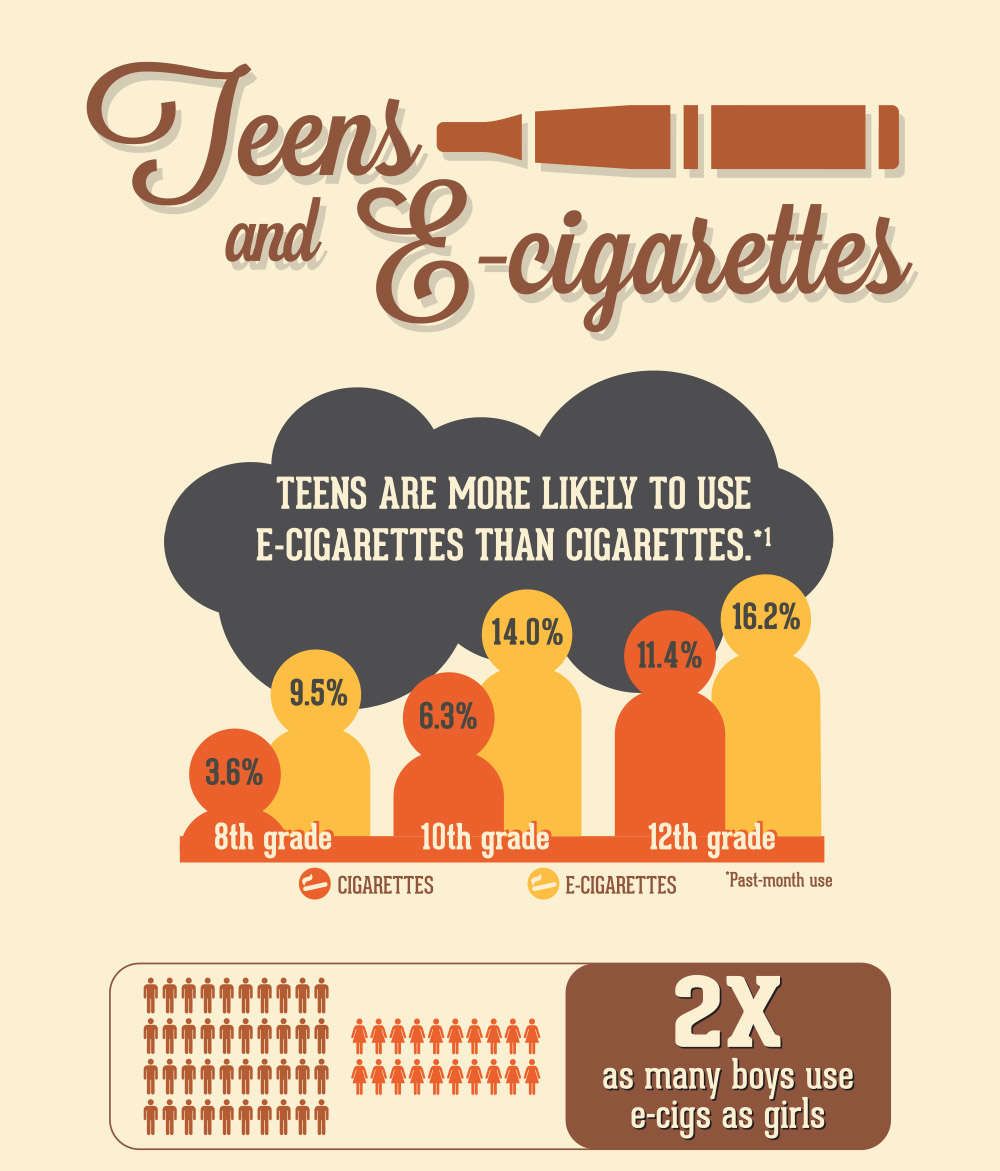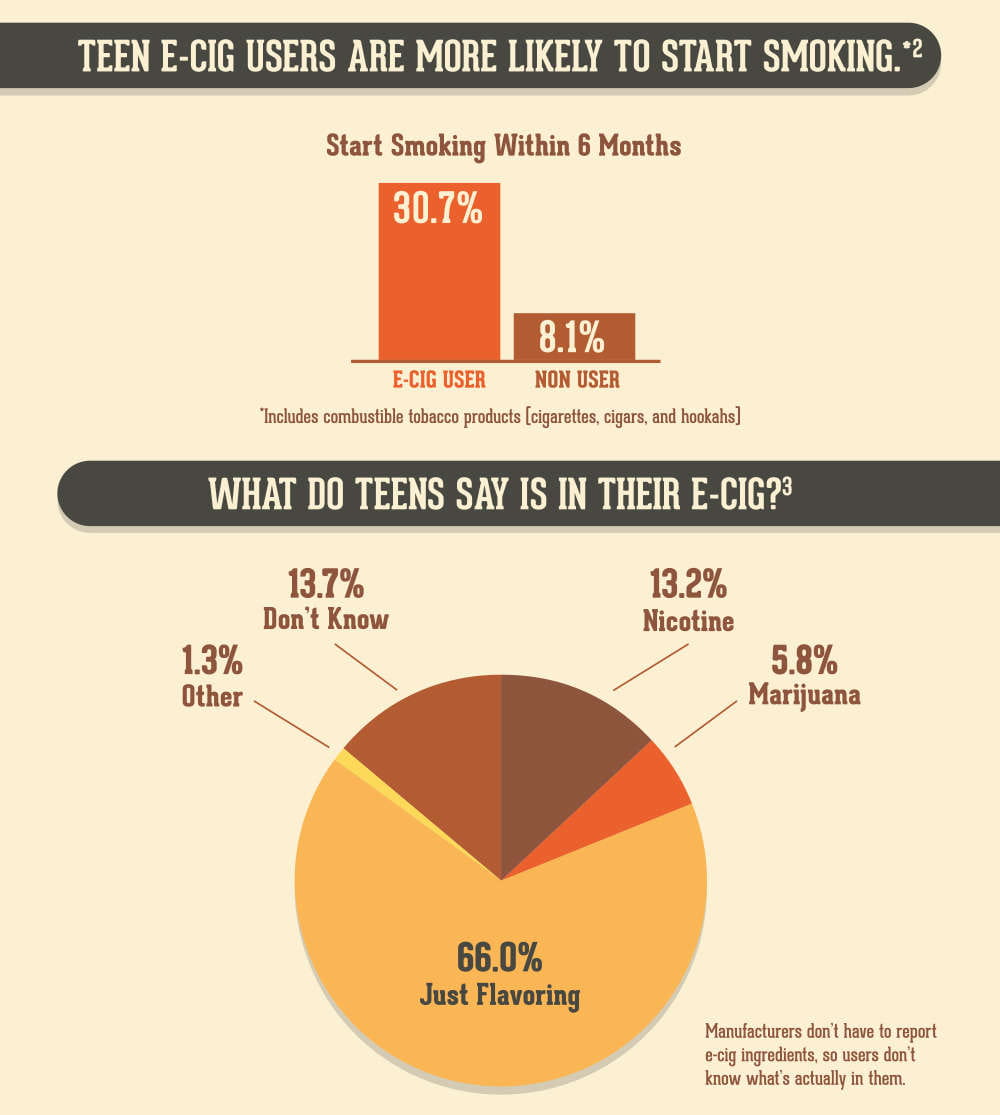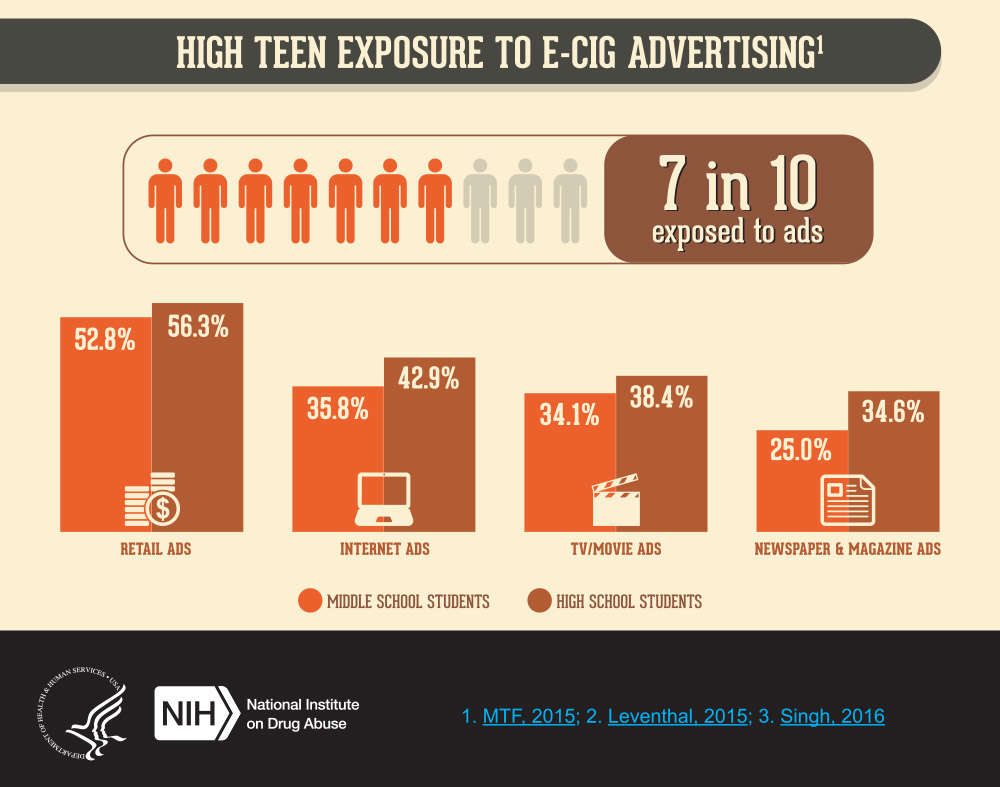Should we really be concerned about teen vaping?

While the general consensus has been that vaping or use of e-cigarettes in place of lighting up tobacco is exponentially “healthier” than inhaling the 7,000+ chemicals (including 69 known carcinogens) of a cigarette, there has remained some question as to whether vaping—especially for young people who’ve never smoked cigarettes before—could be a “gateway” to smoking tobacco.
A new study suggests that vaping may lead to “smoking uptake” among teens. The researchers found that out of 6,258 high schoolers surveyed about smoking and vaping, seven percent of those who vaped—and had never been smokers before—had gone on to start smoking regular cigarettes within 12 months of the start of the survey. The researchers concluded that e-cigarettes pose a serious health threat because at least some youth who likely would never have begun smoking if they hadn’t been exposed to e-cigarettes, may progress to more frequent smoking and be at risk of becoming lifelong smokers.
E-cigarette use among U.S. youth and young adults is now a major public health concern. E-cigarette use has increased considerably in recent years, growing an astounding 900 percent among high school students from 2011 to 2015. – Surgeon General
And while smoking of combustible cigarettes appears to be on the decline among teenagers, the Surgeon General indicates there has been an alarming 900 percent increase in vaping among American high school students between 2011 and 2015. The perception by many young people is that vaping is “harmless” or that it’s nowhere near as dangerous as smoking cigarettes. There is no burning tobacco, no smoke smell, and it can be done discreetly (sometimes in the back of the classroom). It allows kids to experiment in a way that’s perceived as safe.
5.3 percent of middle school students and 16 percent of high school students have used an e-cigarette in the last 30 days. – Surgeon General
So—one might ask—what’s the big deal? If kids are going to experiment anyway, isn’t vaping one of the safer alternatives?
Joshua E. Danley, DO, a pulmonary disease specialist at Main Line Health, has concerns. Dr. Danley points out that it’s only been about 10 years that e-cigarettes have been popular so more research needs to be conducted to fully understand their health impact. “Remember, doctors once prescribed cigarettes for their health benefits,” he says. “What we do know is that studies have shown known carcinogens and toxic chemicals in e-cigarette vapor. While an irrefutable link has yet to be established, these substances have been implicated with coughing, wheezing, shortness of breath, asthma, and bronchiolitis obliterans (also known as Popcorn Lung). Perhaps most troubling is that e-cigarettes may serve as a gateway to traditional cigarettes which have been well established to pose serious risks to an individual's health."
Teen vaping dangers
First of all, yes—vaping compared to smoking burned tobacco is safer. After all, vaping was developed to help adult smokers kick the habit while still being able to enjoy some of the pleasures of smoking. If a person of any age smokes cigarettes and switches to vaping, the immediate health benefits are undeniable.
One of the most compelling concerns about teenagers and e-cigarettes, however, is related to nicotine, a highly addictive chemical that has also been shown to negatively affect brain development, particularly the cerebral cortex and hippocampus, the parts of the brain that are responsible for decision-making and impulse control. As the young brain is still developing up until the age of 30, nicotine can also affect the formation of synapses, tampering with the “wiring” of the brain and setting a teenager up for a lifetime of addictive tendencies and potentially impacting mood, attention span and learning. Learn more from this CDC video about e-cigarettes and brain development risks.
There is also a big question mark about the long-term effects of e-cigs. Even when smoking vape without nicotine, ultrafine particles (in the vapor) as well as flavorings and heavy metals are inhaled deeply into the lungs. So far, there is little research on the effects of e-cig vapor ingredients on the human body. Nor do we know the effects of vaporized cannabis particles (vaping with marijuana) on the lungs and other systems. Since the e-cigarette trend is only about 10 years old, it may take decades for reliable data to be collected and analyzed and for currently unknown harms to be understood.
“E-cigarettes should not be considered benign or harmless,” Dr. Danley adds. “The highly addictive and toxic nature of nicotine is a major concern in adolescents. In addition to that, since no government agency regulates vaping fluids, the safety of these flavored liquids has not been well studied. The substances in e-cigarette vapor have been shown to inflame lung tissue and impair our body's natural processes, potentially increasing one's susceptibility to viral and bacterial infections as well as other negative consequences."



Source: National Institute on Drug Abuse; National Institutes of Health; U.S. Department of Health and Human Services.
Why do teens vape?
Keep in mind the teenage years are a time of exploration, experimentation and rebellion. Teens may vape because they think it looks cool or that vape pen smoke tricks look like fun. They might experiment with vaping, thinking of it as a much safer alternative to regular cigarettes but still with a “cool” factor. Some teenagers like the sweet, candy-like flavors (the sale of which the FDA plans to strictly limit for that very reason). A teen might just be curious or bored or find that vaping is relaxing and takes the edge off. (If you can’t relate, just try giving up your morning coffee.) Indeed, what our teens experiment with could be far more dangerous or addictive so when it comes to talking with them about vaping, it’s important to get real—not righteous.
Talking to teens about vaping
Give teenagers a chance to tell you their thoughts on the matter. They may tell you they’ve tried vaping and don’t like it, or they don’t see what the big deal is either way. Gloom and doom about addiction and dangers is unlikely to deter them from experimentation but stating the facts in a neutral way and letting them know your own feelings about it could lay the groundwork for responsible decision-making in the future.
“For a teen who has never smoked,” adds Dr. Danley, “abstinence from all tobacco products remains the healthiest option. It’s the only responsible message we can give them.”
It might also help to hear from you that it’s their choice whether to vape (or smoke cigarettes, drink alcohol or do drugs) and that you hope they choose not to because you care about their well-being, not because you’re a buzz-kill so to speak.
Main Line Health serves patients at hospitals and health centers throughout the western suburbs of Philadelphia. To schedule an appointment with a specialist at Main Line Health, call 1.866.CALL.MLH (225.5654).
 Content you want, delivered to your inbox
Content you want, delivered to your inbox
Want to get the latest health and wellness articles delivered right to your inbox?
Subscribe to the Well Ahead Newsletter.
